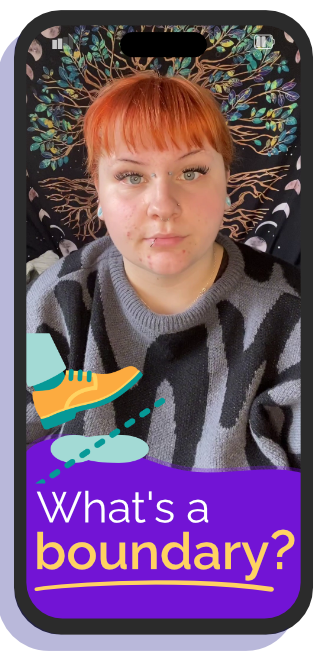Resource Pack: Consent and Boundaries
Consent and boundaries are the foundations of healthy relationships. They shape how we communicate, build trust, and ensure that everyone feels safe and respected - whether in friendships, family relationships, or romantic connections.
But what does consent really mean?
How do we set and communicate our boundaries?
And just as importantly, how do we respond when someone sets theirs?
Understanding these topics helps us navigate relationships with confidence, knowing that mutual respect should always come first.
This resource pack explores what it means to give and receive consent, how to communicate openly in relationships, and how to handle situations where boundaries aren’t being respected. It encourages students to reflect on their own comfort levels, recognise when pressure or manipulation might be at play, and develop the skills to stand firm in their choices.
By starting these conversations, we can empower young people to make informed decisions, respect others, and build relationships that feel safe, positive, and equal.
Preview
Watch a preview of 'Consent - Legal Definition’ - a video designed to help learners of all ages understand what consent really is.
In this video, Nate helps break down the important concept of consent. He explains that consent is a choice made by someone with both the freedom and capacity to give it.
The video takes students through what each of these terms means - from understanding that consent is a clear decision to knowing that it must be given without pressure or manipulation.
It’s a crucial resource to start conversations about healthy relationships and boundaries.
Got Peerscroller? Scroll down for more resources.
For all Key Stages 3-5
This video by Evie highlights the importance of recognising and communicating what you’re comfortable with, whether it’s physical space, emotional needs, or behaviour.
It encourages students to respect others' boundaries and to feel empowered to set their own. Understanding boundaries helps create healthy relationships and ensures everyone feels respected!
In this video, we follow a conversation between two friends where one learns the importance of respecting someone’s "no" after previously being rejected.
The scenario highlights the significance of listening to boundaries and moving on gracefully, even when feelings are involved. It’s a valuable video for teaching students how to navigate rejection with respect and emotional maturity.
Setting and maintaining boundaries is an important life skill, but what happens when someone ignores them?
This video explores practical strategies for handling situations where personal boundaries aren’t respected, from gentle reminders to setting clear consequences. Using relatable examples, it encourages students to take control of their own boundaries while maintaining positive relationships.
For Key Stages 3/4
In this video, Evie encourages young people to pay attention not just to the words someone says, but also to their body language, tone, and facial expressions, which can sometimes convey a different message.
It’s a useful resource for exploring healthy relationships and teaching students how to recognise and respond to both verbal and nonverbal cues in a respectful way!
Disagreements are a normal part of any healthy relationship, but how you handle them can make all the difference.
This video by Sunny explores how to deal with disagreements in a positive, constructive way, focusing on clear communication and setting boundaries to avoid unnecessary conflict.
It's important to approach disagreements with empathy and understanding, ensuring that both sides are heard and respected.
This video by Evie uses a simple analogy to explain the concept of consent.
Comparing consent to ordering coffee helps to break down the idea of needing clarity, being specific, and never assuming. The aim is to ensure students understand the importance of clear communication and mutual respect when it comes to consent, not just in sexual contexts but in any situation where boundaries need to be discussed.
For Key Stage 5
This video by Sam helps students explore the concept of consent in maturing relationships. It reinforces that consent is always a personal choice and that being in a relationship doesn’t mean automatic agreement to sex.
It challenges myths around obligation and ownership, encouraging students to prioritise their own boundaries and respect those of others.
Use this resource to spark discussion around healthy relationships, mutual respect, and the importance of enthusiastic consent.
This video introduces the concept of advocating for yourself during sex, helping students understand that their comfort, boundaries, and feelings matter just as much as their partner’s.
It breaks down the idea that sex is a mutual experience, encouraging open communication about likes, dislikes, and personal limits.
The video also provides examples of what students can say in the moment to express their needs confidently.
This video helps students develop healthy communication skills in relationships by teaching them how to bring up difficult topics with kindness and clarity.
It introduces practical strategies to navigate tough conversations without conflict, reinforcing that good communication involves both speaking and listening.













